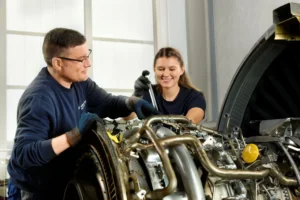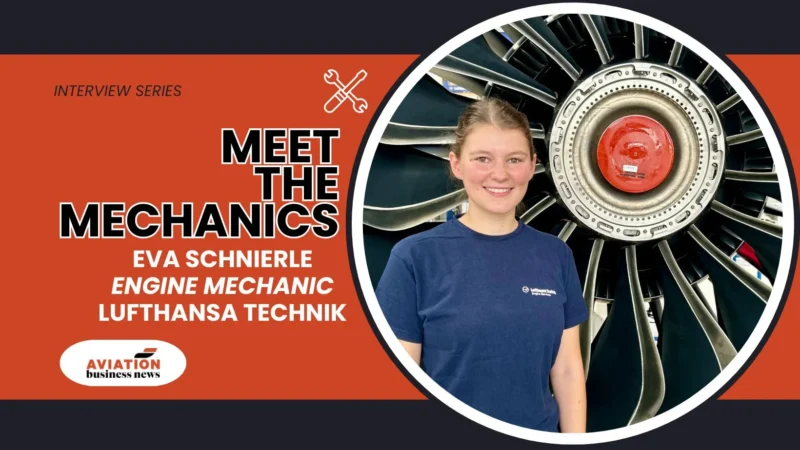In the first instalment of our ‘Meet the Mechanics’ interview series – created to shine a light on the hands-on professionals who keep aircraft in top condition – we feature Eva Schnierle of Lufthansa Technik, who shares how starting out in a glider club workshop sparked her passion for precision in aircraft engine maintenance, and the day-to-day realities of the job.
How did you get into aviation maintenance, and what inspired your career path?
After completing my school education, I pursued a bachelor’s degree in mechanical engineering. During the COVID-19 pandemic, I realised that pure academic study was often too abstract and theoretical for me. Aviation had always fascinated me and my entry into the field was significantly influenced by my involvement in a glider club. I volunteered there and we had our own workshop where we performed maintenance on the gliders. This hands-on experience sparked my interest in aviation maintenance.
The technology behind aviation is incredibly fascinating. I enjoy getting hands-on because it makes me understand the underlying principles much better. Plus, I can see the results of my work and quickly address any problems that arise. That realisation led me to switch to becoming a mechanic. Recently, I completed my vocational training as an aircraft mechanic with a specialisation in engine technology at Lufthansa Technik. I find engines especially exciting because they are so complex and are a fundamental reason why airplanes can fly.
Can you walk us through a typical day or shift in your role?
We operate on a two-shift system. I am currently assigned to the early shift. Every third week, I also work the late shift. Our early shifts start at 6:00am and end at 14:15pm.
Our work is all about teamwork. In the morning, we are assigned to one of our work areas. Then, we meet with the four to five people who will be working on the engine. We review what happened the night before and go through the task at hand.
This said, we handle a lot of documentation that precisely records the engine’s status. Depending on this status, we perform either assembly or disassembly tasks, which are divided among the team members. Some tasks are impossible to do alone, like installing large modules on the engine, which requires three to four people. As a newly trained mechanic, I always perform tasks alongside a mentor.
What’s one particularly memorable challenge you’ve faced on the job – and how did you resolve it?
Documentation is a significant part of our work. When I install a tube, the actual screwing accounts for only about 30-40% of the job. Much of the work involves dealing with manuals, job cards and internal processes. For example, these specify if and how I am allowed to install that specific tube with specific screws and seals on the engine.
It can be challenging, but you push through it.

Technical English is something you don’t necessarily learn in school. It’s definitely different from everyday conversational English. We have our own courses for that during vocational training. You master it through repetition, constantly diving in and learning through practice.
There are also many service bulletins for engines. It’s crucial to focus and work precisely to ensure the customer receives the exact service they requested. Even a small change like a screw or a part number can make a difference. Everything must be done with utmost concentration. If I feel uncertain, I ask my experienced colleagues and don’t let stress get to me.
How do you and your team approach safety and reliability in your work?
Safety is our top priority. We know how important it is to work accurately. While routines are helpful, it’s also vital to avoid ‘bad’ habits. Our teams, usually made up of four to five people, are rotated regularly to keep things fresh and maintain high standards, similar to how pilots and co-pilots switch roles.
We follow the manuals closely and double-check everything. Two highly qualified people independently verify each step when working on critical modules. The experience of long-term employees is invaluable. If you are unsure about something, you should always ask for a second opinion. It’s crucial to question everything critically to achieve the best results. Clear communication and mutual respect are essential in our daily collaboration.
Each step we need to take is carefully documented in our job cards. Every action is recorded with a personnel number, so it’s easy to trace who did what and with which tools. Shift handovers are both verbal and written in the job card, ensuring smooth transitions and consistency in our work.
What changes or innovations do you see shaping the future of aircraft maintenance?
During my vocational training, I have already tested training with artificial intelligence (AI). This could become more common, especially for engine type courses we receive here. AI could assist with location training, showing where different parts are on the engine and help visualise complex systems in a more intuitive way. Plus, it’s already being tested in production and supports visual inspections today, for example in engine borescope inspection.
I am open to this new technology as long as it supports the work of mechanics. However, I don’t think the mechanic job will disappear because of AI. Each engine is different and the tasks that need to be done can vary greatly. Therefore, I think the expertise and hands-on skills of mechanics will always be necessary.
What do you enjoy most about the job – and what keeps you motivated day to day?
I love working with aircraft engines because they are very complex and interesting. It’s exciting to understand how they work and see the results of my efforts when fixing them.
Learning new things every day keeps me motivated. Aviation maintenance is always changing, so I need to stay updated with the latest technologies and methods.
Working with my team is also very inspiring. My colleagues and mentors are experienced and passionate about aviation. We support each other and solve problems together, which makes the job very enjoyable.
The special nature of aircraft maintenance and the chance to work with advanced technology make my job feel important and exciting. This combination keeps me motivated and happy to come to work every day, knowing that I contribute to something meaningful and technically challenging.
Aviation Business News (ABN)/MRO Management will be featuring more mechanics in this interview series over the coming weeks. If you would like to nominate a mechanic to take part, please get in touch with Editor, Craig Waters via email here.
